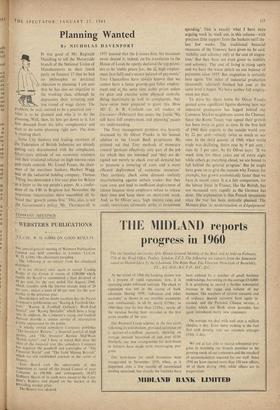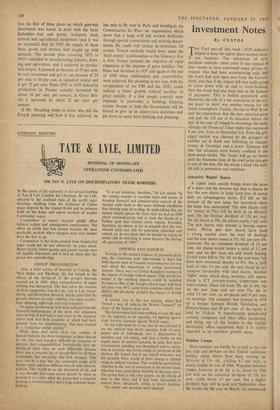Planning Wanted
By NICHOLAS DAVENPORT it was good of Mr. Reginald \laudling to tell the Merseyside branch of the National Union of Manufacturers at their lunch party on January 17 that he had no philosophic or doctrinal objection to planning. I am sure that he has also no objection to the working class, although he .deprecates their irritating end- less round of wage claims. The Problem. he said, seemed to be a practical one— What is to be planned and who is to do the planning. Well, then, let him get down to it. Let him descend from his lofty complacency and start to do some planning right now. The time is running short.
SOme City bankers and leading members of the Federation of British Industries are already getting very discontented with the complacent, 71iissez-faire attitude of our economic ministers and their irrational reliance on high interest rates ,end credit controls. Mr. Lionel Fraser, the chair- %man of the merchant bankers, Herbert Wagg, Wind of the industrial holding company, Thomas has demanded a five-year plan for Britain 'in) a letter to the top people's paper. At a confer- ence of the FBI in Brighton last. November the Important industrialists there assembled all in- sisted that 'growth comes first.' This, alas, is not The Government's policy. Mr. Thorneycroft in 1957 insisted that the £ comes first; his successor never denied it; indeed, on his translation to the House of Lords he openly declared the top priori- ties to be 'stable prices [i.e., the £], high employ- ment [not full] and a secure balance of payments.' Tory Chancellors have always known that we cannot have a faster growth and fuller employ- ment and at the same time stable prices unless we plan and exercise some physical controls. Being doctrinaire as well as complacent, they have never been prepared to grant this. How Mr. C. A. R. Crosland can tell readers of Encounter (February) that under the Tories 'We still have full employment and planning' passes my understanding.
The Tory management problem was bravely discussed by Sir Oliver Franks in his 'annual address to the Lloyds Bank proprietors. He pointed out that Tory methods of monetary control 'perform effectively only part of the job for which they are intended' and 'they arc de- signed not merely to check over-all demand but to promote a lowering of costs and a more efficient deployment 'of economic resources.' They certainly check some demand—Unfairly discriminating against certain trades—but they raise costs and lead to inefficient deployment of labour because most employers refuse to release their men and keep them on short-time work. And, as Sir -Oliver says, 'high interest rates and credit restrictions ultimately strike at investment spending.' This is exactly what I have been arguing week in, week out, in this column—with precious little support from the bankers until the last few weeks. The traditional financial measures of the Treasury have given us, he said, 'stability and solvency only at the cost of stagna- tion.' But they have not even given us stability and solvency. The cost of living is rising again and we have the worst deficit on our balance of payments since 1955. But stagnation is certainly here again. The index of industrial production (seasonally adjusted) finished last year at the same level it began. We have neither full employ- ment nor plan.
To drive his thesis home Sir Oliver Franks quoted some significant figures showing how our industrial production has lagged behind our Common Market neighbours across the Channel. Since the, Rome Treaty was signed their growth has been twice as great as ours. In the first half of 1960 their exports to the outside world rose by 22 per cent.—exactly twice as much as our own. In the third quarter of 1960, when world trade was declining, theirs rose by 9 per cent.: ours by 3 per cent. As Sir Oliver says: `If we mark time for three years out of every eight while others go marching ahead, we are bound to fall behind the general progress.' But he might have gone on to give the reasons why France, for example, has grown economically faster than we have in recent years. It is a fair comparison, for the labour force in France, like the British, has not increased very rapidly as the German has done. The explanation is that French investment since the war has been centrally planned. The Monnet plan 'de modernisation et d'equipentent' was the first of three plans on which post-war investment was based. It dealt with the basic industries—fuel and power, transport, steel, cement and agricultural equipment—and it was so successful that by 1950 the supply of these basic goods and services had caught up with demand. The second plan—covering 1952 to 1957—attended to manufacturing industry, hous- ing and agriculture, and it achieved its produc- tion targets. It planned an increase of 35 per cent. in real investment and got it: an increase of 25 per cent. to 30 per cent. in industrial output and it got 35 per cent. From 1953 to 1959 industrial production in France actually increased by about 10 per cent. per annum; in Great Brit- ain it increased by about 21 per cent. per annum.
If Mr. Maudling wants to know who did the French planning and how it was achieved, he
has only to fly over to Paris and investigate the Commissariat du Plan—an organisation which never had a large staff but worked brilliantly through special commissions and existing depart- ments. He could well imitate its technique. Of course, French methods would have upset the `hard money' traditionalists at the Treasury, For a time France pursued the objective of rapid expansion at the expense of price stability. The franc was devalued in 1957 and again at the end of 1958 when stabilisation and convertibility were achieved. But planning in our case, with the co-operation of the FBI and the TUC, could achieve a faster growth without sacrifice of price stability if a few simple controls were imposed, in particular, a building licensing system. Sooner or later the Government will be forced to give up its laissez-faire doctrines and get down to some hard thinking and planning.











































 Previous page
Previous page